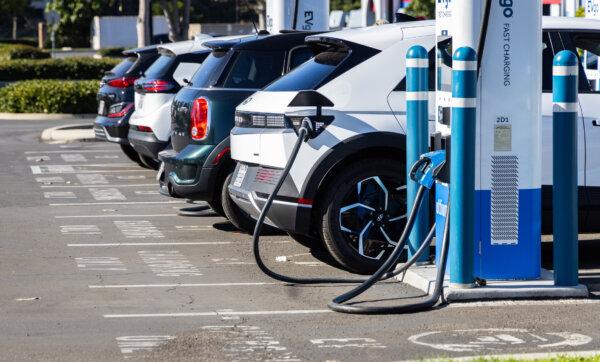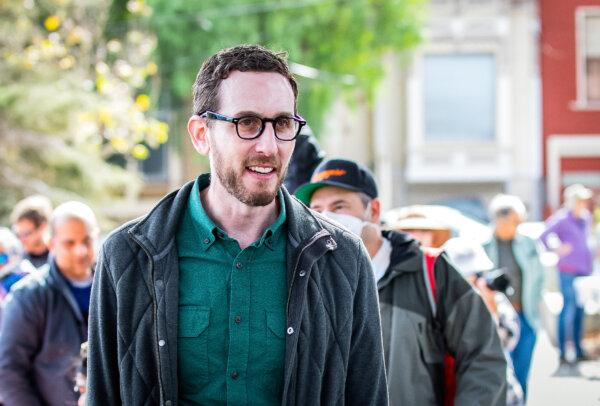California is testing a pilot program to determine if charging drivers per mile driven could better fund the state’s highway infrastructure and road repair budgets.
The program is accepting 800 participants who can earn as much as $400 by completing surveys, calculating their miles driven within the state, and paying charges for road use. Interested drivers need to apply by the end of June and will be notified of eligibility in July.
Per-mile taxes are yet to be determined by the Legislature and could range from 2 cents to 4 cents, according to the program.
Any gas taxes paid while enrolled in the program, which will run from August to January, would be reimbursed.
The pilot project is a result of the passage of Senate Bill 339 in 2021, authored by Sen. Scott Wiener.
Mr. Wiener said the program is needed to explore better ways to fund road repairs—traditionally funded by gas tax—as electric vehicles become more widespread.
“The current gas tax structure is becoming a less effective basis for transportation infrastructure funding,” Mr. Wiener said in legislative analyses. “As policies, encouraging electric vehicles continue to be implemented, and as gasoline consumption continues to decrease, California will need to ensure a secure, stable funding future for transportation.”
Californians driving gas-powered vehicles pay on average about $300 per year in fuel taxes, according to the state road charge program’s website.
Currently, about 80 percent of road and highway repairs are funded by such taxes—now 57.7 cents per gallon, although set to increase to 59.6 cents per gallon on July 1—added to prices at the pump.
Some critics suggest the state’s zero-emission vehicle objectives are threatening the about $9 billion collected annually in gas tax revenues. The state has a goal of all new passenger automobiles sold in the state being zero emission by 2035.
Slightly less than 1.2 million electric vehicles were registered in California in 2023. About 20 percent of all passenger vehicles sold in 2023 were zero-emission, according to the California Energy Commission.
With electric vehicles weighing hundreds to thousands of pounds more than traditional vehicles—primarily because of battery weight—roads could experience more wear and tear, experts have warned.
An additional 2,000 pounds in vehicle weight can lead to a 50 percent increase in pavement damage, according to the U.S. Department of Transportation.

An electric vehicle charging station in Irvine, Calif., on Nov. 28, 2023. (John Fredricks/The Epoch Times)
A 2024 study by the University of Nebraska-Lincoln sponsored by the U.S. Army Engineer Research and Development Center also found that, due to their weight, electric vehicles can cause more damage to highway infrastructure when accidents occur.
Owners of zero-emissions vehicles currently pay $118 in fees per year to cover road repairs because they aren’t subject to fuel taxes, however as more electric vehicles take to the road, the state is looking to make up the difference by creating a pay-by-the-mile tax.
Proponents say such a system is akin to utility rate charges.
“Everyone would pay their fair share for road repairs based on how much they drive, not the kind of car they own,” the state’s road charge pilot program website reads. “California is working to develop a road charge program that is fair, transparent, and sustainable so that it meets our road maintenance needs now and in the future.”

California state Sen. Scott Wiener hosts an event in San Francisco on Oct. 23, 2022. (John Fredricks/The Epoch Times)
Critics argue the system could be detrimental to lower-income drivers who must commute longer distances because they live in communities where housing costs are cheaper, and are farther from city centers.
“Some families can’t afford to live near the city where they work, so they find affordable housing in the outskirts—sometimes an hour or more from their place of employment—and any additional costs will hurt,” John Morris, a longtime resident of Los Angeles, told The Epoch Times. “This is potentially a burden on Californians who are working hard but are struggling to pay their bills.”
Others are concerned that if a road-use charge is ultimately implemented statewide, drivers with traditional gas-operated vehicles will have to pay it in addition to the gas tax.
One resident skeptical of the plan said the per-mile charges are jeopardizing adoption of electric and alternative fuel vehicles, as budget-oriented consumers have less incentive to switch.
“Much of the EV savings comes from avoiding the high gas tax,” Dr. Houman David Hemmati—an ophthalmologist and pharmaceutical entrepreneur and executive based in Beverly Hills—posted on May 14 on X. “We must push back against all these new taxes.”
Gas taxes were approved in California in 1923, when the state imposed a 2-cent per gallon tax. The federal government followed suit 11 years later, adding an additional 1 cent tax per gallon.
By 1993, the federal government tax was 18.4 cents per gallon, where it has remained, and California’s tax was 18 cents per gallon.
The Golden State has since continued to increase fuel taxes—including a 12-cent hike in 2017 and subsequent increases in following years.
A similar pilot program begun in 2016 ran for nine months to study the feasibility of per-mile fees. In total, 5,000 vehicles and more than 37 million miles driven were analyzed.
In a final report issued in 2017, the study found that road-charge programs are worthy of further research, while acknowledging that differences in vehicles and fuel efficiency standards make finding equitable solutions challenging.














